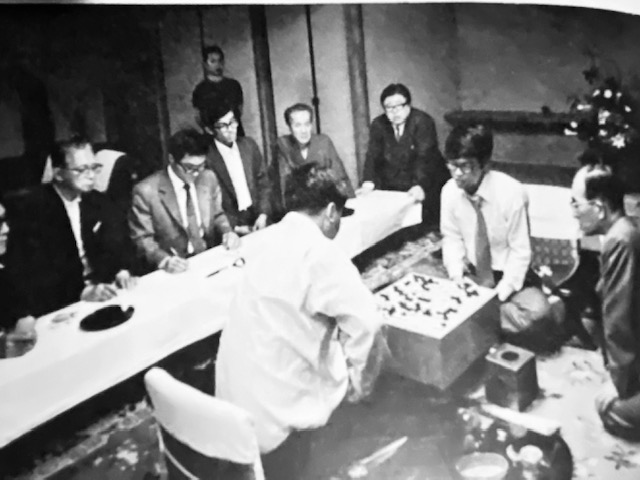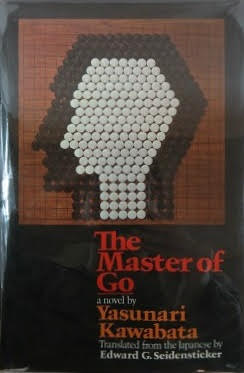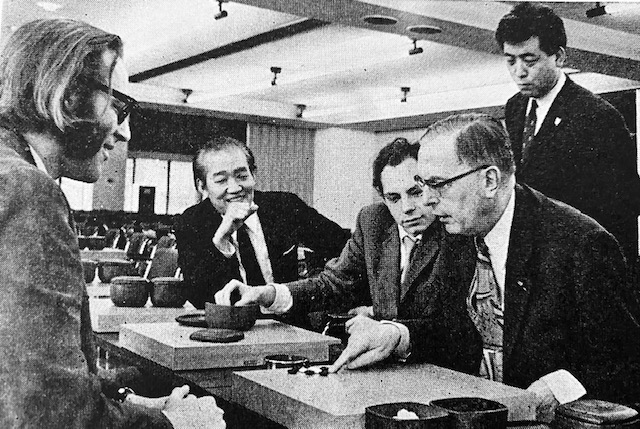by John Power, Japan correspondent for the E-Journal
Photos (l-r): 1st Hoban Fujisawa Rina; 1st Hoban Wu Yiming; 9Globis Fukuoka 2nd; 9Globis Wang the winner; 9th Hollyhock Uenl (left) beats Okuda; 27LG Shibano best 8; 77honinbo2 Ichiriki Iyama rugby jerseys; 77honinbo2 playing room view of ground; 77honinbo3 Iyama; 77honinbo4 Iyama (left) Cho Chikun Ichiriki; 77honinbo4 Kyushu Nat Museum; Meijin-Kisei Leagues.
Iyama sets new record in Honinbo title
After Ichiriki Ryo’s success in taking the top title from Iyama Yuta in this year’s Kisei title match, most fans probably installed him as the favorite in the 77th Honinbo title match, but that’s not how things worked out. Iyama took a full measure of revenge on his closest rival.
As described in my report of May 21, Iyama took the first game through tenacious play in the late middle game and endgame. This pattern continued in the other games of the best-of-seven.
The second game was played in the Special Room at the Kumagaya Rugby Ground in Kumagaya City, Saitama Prefecture, on May 24 and 25. The room is on the fourth floor of the stadium and offers a view of the playing field. Presumably the venue was chosen by Kumagaya City, which was a supporting sponsor for this game. (Recently, it seems to have become usual for the cities etc. where games are staged to become supporting sponsors just for that game. This gains them publicity and presumably relieves the financial burden on the main sponsors of the tournament.) Kumagaya is a mecca for Japanese rugby fans, and some games in the 2019 Rugy World Cup, which Japan hosted, were played there. The players got into the spirit of things by posing in rugby jerseys holding on to footballs, though they switched back to the regulations suits to play the game.
As indicated above, Ichiriki made another good start, but Iyama (white) refused to give up. He played aggressively, complicating the position and eliciting an error from Ichiriki. Once he had upset his lead, Iyama played solidly, giving Ichiriki no chance to get back into the game.
The third game was played at the Fujii residence in Yamada Hot Spring in Nagano Prefecture on June 1 and 2. Once again, Ichiriki (W) took the lead in the opening and early middle game, but Iyama fought very strongly in the latter part of the game (meaning, in this case, from about move 121 on). He sacrificed a group in a way that surprised the professionals following the game on the spot, but that was part of a far-seeing whole-board strategy. Under pressure, Ichiriki played some sub-optimal moves that let Iyama dominate the game. Not only did he upset Ichiriki’s lead, he gradually increased his own lead. When Ichiriki resigned, after Black 259, he was ten points or more behind on the board. If you have access to a game record, check out Black 179, an unlikely-looking tesuji that Ichiriki didn’t see. It enabled Iyama to maximize his territory in a corner fight.
The fourth game was played at the Kyushu National Museum in Dazaifu City, Kyushu, on June 11 and 12. This turned out to be the most spectacular game of the series. Early in the game, there was a spectacular trade, in which Ichiriki (black) sacrificed a group in exchange for capturing some white stones. However, the result was a little advantageous for Iyama. Ichiriki subsequently played some dubious moves, letting Iyama expand his lead. Ichiriki resigned after 196 moves.
The referee for this game was Cho Chikun, so he had a close-up view as Iyama broke his record by scoring his 11th successive victory in a top-seven title. It was also Iyama 68th title (55 of them top-seven titles), so he is drawing closer and closer to Cho’s record of 75 (42).
Iyama’s comment: “After the new year started, there was a difficult period for me when I couldn’t get good results. Things were tough for me, so I’m happy I got a good result this time. . . . As a go fan watching Cho win ten in a row, I never dreamed I could challenge his record. It’s a great honor.”
Cho’s comment: “It felt good when we were lined up together on ten-in-a-row, but now that he’s gone past me, I feel bad. Now it’s happened, I want him to win about 20 in a row. He defended with straight wins, but in this series Ichiriki’s content was better. He should be able to keep competing with confidence.”
There was no quote from Ichiriki in the newspaper. First prize is 28,000,000 yen (about $208,955, at $1=¥134). Below is a list of the top successive-title records.
11: Iyama Honinbo (2012~22)
10: Cho Chikun Honinbo (1989~98)
9: Iyama Kisei (2013~21)
9: Takagawa Kaku Honinbo (1952~60)
8: Kobayashi Koichi Kisei (1986~93)
8: Kato Masao Oza (1982~8
Ueno to challenge for Hollyhock Cup
The semifinals and final of the 9th Aizu Central Hospital Women’s Hollyhock Cup were held at the Konjakutei inn in Aizu Wakamatsu City, Fukushima Prefecture, on May 21 and 22. In the semifinals (May 21), Ueno Asami (B) beat Kibe Natsuki 2-dan by resignation, and Oku Aya 4-dan (W) beat Suzuki Ayumi 7-dan, also by resignation. The next day, Ueno (B) beat Okuda by resignation and earned the right to challenge Fujisawa Rina for the title. Fujisawa has held this title for five years in a row and six times overall. Ueno made two unsuccessful challenges, for the 6th and 8th Cup; she lost 0-2 each time, so she will be looking for revenge.
Wu of China dominates 1st Hoban Cup
The Hoban Cup Seoul Newspaper Women’s Baduk Championship 2022 is a new international tournament run along the same lines as the Nong Shim Cup, with the difference that it is split into just two rounds, not three. The first round was dominated by the 15-year-old Wu Yiming 3-dan of China, who won five games in a row. According to Chinese rules for international tournaments, this earned her a promotion to 4-dan. The second round is scheduled for October.
Game 1 (May 22). Wu Yiming 3-dan (China) (W) beat Nakamura Sumire 2-dan (Japan) by resig.
Game 2 (May 23). Wu (W) (B) beat Lee Suljoo 1-dan (Korea) by resig.
Game 3 (May 24). Wu (B) beat Suzuki Ayumi 7-dan (Japan) by 11.5 points.
Game 4 (May 25). Wu (B) beat Heo Seohyun 3-dan (Korea) by resig.
Game 5 (May 26). Wu (B) beat Xie Yimin 7-dan (Japan) by resig.
Game 6 (May 27). Kim Jaeyeong 7-dan (Korea) (W) beat Wu 4-dan by resig.
Game 7 (May 28). Fujisawa Rina 5-dan (Japan) (B) beat Kim by resig.
LG Cup: Shibano makes best eight
The opening rounds of the 27th LG Cup, an international tournament sponsored by the LG Corporation in Korea, were held on the net from May 30 to June 1. Twenty-four players took part, with 16 starting out in the first round and eight being seeded into the second round. As the host country, Korea had 13 players; China had seven, Japan three, and Chinese Taipei one. The Japanese participants were Shibano Toramaru and Yo Seiki, who were seeded, and Sada Atsushi, who won the Japanese qualifying tournament. Shibano, who was seeded into the second round, was the only Japanese player to make the best eight.
The time allowance is three hours, followed by 40-second byo-yomi x 5. Results follow (for most of the games, I don’t have full details).
(Round 1, May 29). Shin Minjun 9-dan (Korea) beat Shi Yue 9-dan (China); Zhao Chenyu beat Park Geunho 6-dan (Korea); Yo Seiki (Yu Zhengqi) 8-dan (Japan) (B) beat Park Hamin 9-dan (Korea) by resig.; Kim Jiseok 9-dan (Korea) beat Gu Jihao 9-dan (China); Park Jinseol 6-dan (Korea) (B) beat Sada Atsushi 7-dan (Japan) by resig.
(Round 1, May 30) Wang Yuanjun 9-dan (Ch. Taipei) beat Weon Seongjin 9-dan (Korea); Kang Dongyun 9-dan (Korea) beat Cho Hanseung 9-dan (Korea); Kim Myeonghoon 9-dan (Korea) beat Seol Hyunjun 7-dan (Korea).
Round 2 (31 May). Mi Yuting 9-dan (China) beat Cho; Shin Jinseo 9-dan (Korea) (B) beat Yo by resig.); Ke Jie 9-dan (China) beat Shin Minjun; Ding Hao 9-dan (China) beat Kim; Yang Dingxin 9-dan (China) beat Park.
(Round 2, June 1). Shibano Toramaru 9-dan (Japan) (W) beat Wang by resig.; Kang beat Park Junghwan 9-dan (Korea); Kim beat Byun Sangil 9-dan (Korea).
Semifinal (Nov. 24) pairings: Ke v. Kang, Mi v. Shin Jinseo, Ding vs. Kim, Shibano v. Yang.
Globis Cup
The 9th Globis Cup was held in the same week at the LG Cup, so suddenly there was a lot of activity in international go. Unfortunately, this tournament, too, had to be held on the net. Founded in 2014, it is a tournament for players under 20. It is sponsored by the Globis Graduate School of Business. The tournament is run by the NHK format: 30 seconds per move, with ten minutes of thinking time to be used in one-minute units. First prize is 1,500,000 yen; second prize is 250,000 yen, and third prize is 100,000 yen. The tournament system is complicated: the 16 participants are split up in four mini-knockout tournaments, with the top four proceeding to the main tournament. However, there is also a losers’ tournament in which four more players earn seats in the main tournament. Thanks to this second chance, Kevin Yang of North American, who is listed as amateur 7-dan, won a seat in the main tournament. The above games were all played on June 4. Results in the main tournament, held on June 5, follow.
(Quarterfinals) Zhou Hongyu 6-dan (China) beat Lai Junfu (Ch.Taipei); Fukuoka Kotaro 3-dan (Japan) beat Kevin Yang; Wang Xinghao 7-dan (China) beat Tsuji Shigehito 3-dan (Japan); Tu Xiaoyu 7-dan (China) beat Lee Yeon 4-dan (Korea).
(Semifinals) Fukuoka beat Zhou; Wang beat Tu.
(Final) Wang (W) beat Fukuoka by resig.
(Play-off for 3rd place) Tu beat Zhou.
Wang Xinghao also won this tournament last year, beating Tu Xiaoyu in the final.
Fujisawa fails to reach best four in Tengen
Fujisawa Rina’s excellent run in the 48th Tengen tournament finally came to an end on June 2. Playing white, she lost by resignation to Otake Yu 6-dan. If she had won, she would have been the first woman to make the best four in a top-seven title. Actually, Fujisawa took the lead in the opening, but Otake was able to pull off an upset.
Shibano leads in 47th Meijin League
Shibano Toramaru, former Meijin, holds the sole lead on 4-1, followed by Ichiriki Ryo Kisei and Shida Tatsuya 8-dan on 4-2 and Kyo Kagen Judan on 3-2. Recent results follow.
(May 19) Ichiriki Ryo Kisei (W) beat Motoki Katsuya 9-dan by resig.
(June 2) Yamashita Keigo 9-dan (W) beat Hane Naoki 9-dan by resig.
(June 9) Shida Tatsuya 8-dan (B) beat Yo Seiki 8-dan by 1.5 points
Kisei S League
Two games in the second round have been played so far. On June 2 Murakawa Daisuke 9-dan (W) beat Kyo Kagen Judan by resignation, and on June 6 Shibano (B) beat Takao Shinji 9-dan by resig. On 2-0, Shibano Toramaru is the only undefeated player.
Sumire reaches 100 wins
Scoring one’s 100th win is not usually considered a significant landmark, but things are different if the player concerned is only 13 years old. The Yomiuri reported on June 7 that Nakamura Sumire 2-dan had recorded her 100th win in a game played at the Nihon Ki-in on the previous day. Taking white, she beat Kato Keiko 6-dan by resignation in the second round of the main section of the 41st Women’s Honinbo tournament. At 13 years three months, she set yet another youth record. The previous record of 15 years 11 months was set by Cho Chikun, Honorary Meijin. At a press conference after the game, Sumire commented: “I’m not very aware of my number of wins. It was like: really?” When a reporter commented that she had done it in three years two months as a pro, she smiled. “I don’t really know, but that seems fast.” To become the challenger, she needs three more wins. Sumire has played only two games since my last report, one of them the game reported here. For the other, see the report on the Hoban Cup above.
Most wins (as of June 10)
The latest Go Weekly gave only the top two places, so positions 3 to 10 are my best guess. There are five women in the top ten.
1. Ueno Asami: 27-5
2. Ichiriki Ryo Kisei: 26-10
3. Nyu Eiko 4-dan: 20-10
4. Koike Yoshihiro 7-dan: 19-4; Ida Atsushi 8-dan: 19-6; Nakamura Sumire 2-dan: 19-10
7. Fujisawa Rina, Women’s Honinbo: 18-7
8. Kyo Kagen Judan: 17-6
9. Suzuki Ayumi 7-dan: 16-14
10. Ikemoto Ryota 2-dan: 15-6
Most successive wins
10: Hikosaka Naoto 9-dan
6: Yo Kaei 8-dan, Ueno Risa 1-dan (younger sister of Ueno Asami)
5: So Yokoku 9-dan, Hirata Tomoya 7-dan, Mitani Tetsuya 8-dan, Hirata Tomoya 7-dan, Hirose Yuichi 6-dan, Sakai Takashi 2-dan, Kawahara Yu 1-dan
Recently ended streaks
13: Koike Yoshihiro
6: Fujisawa Rina
5: O Rissei 9-dan, Son Makoto 7-dan, Nishioka Masao, Fujisawa Rina, Konishi Yoshiakira 1-dan, Yamashita Keigo 9-dan, Shibano Toramaru 9-dan
Correction
There was some funny arithmetic in my article on Ishida Yoshio’s government decoration (ejournal, May 23). Total games played by Ishida should have read 1870. His record, updated to June 7, is: 1146 wins, 725 losses, 1 no-result, total 1872 games. Thanks to Peter St. John for pointing out my mistake.
NOTE: John Power sent in these reports on June 13 but publication was delayed due to EJ Managing Editor being on travel; our apologies for the delay.






















